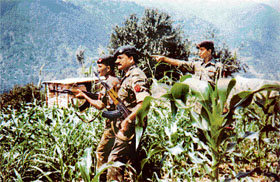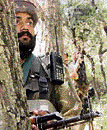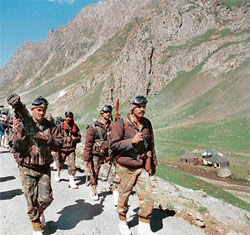|
Fighting stress
Last year saw about 130 suicides in the Army. Admitting that the deaths are related to stress, the Army now plans to recruit 400 psychiatrists besides adopting other stress-busting measures.
Vijay Mohan reports

The Army claims that most cases of suicide occurred after the soldiers returned from leave |
On
December 1, a
lieutenant colonel posted on a staff appointment in one of the
counter insurgency formation headquarters was found dead in his
room. Reports suggested that he had committed suicide.
Whatever be the
reason behind his death, the officer — with 14 years of
service behind him — became another statistic in the long list
of armed forces personnel who have either been killed by
colleagues or taken the extreme step of committing suicide while
serving in the high-risk, stress-prone low intensity conflict
(LIC) environment in Jammu and Kashmir as well as the
North-East. Just about a month ago, a lieutenant colonel was
shot by a jawan who had been reprimanded.
As many as 450
soldiers died in the past 42 months. Out of them, 355 are stated
to have committed suicide. To tackle such distress deaths in its
ranks, the Army now plans to recruit 400 psychiatrists. "We
have sent a proposal for recruiting 400 psychiatrists of officer
rank so that senior officers can also approach them," said
Director-General of the Armed Forces Medical Service V.K. Singh
during his visit to Chandigarh last month.
"The most
important factor for stress is the family left behind by
soldiers posted in remote areas," he said. "Unlike as
in some western countries, the Indian soldier is emotionally
very attached to his family. Leaving them behind under changing
socio-economic conditions, with an unresponsive civilian
administration and no joint family to look after their needs,
leaves him insecure," he added.
Distress toll
  Figures
released by the Ministry of Defence disclose that from January
1, 2006, to November 14, 2006, the number of suicides in the
Armed Forces was 128, which include five officers, five junior
commissioned officers and 118 personnel from other ranks. Col
Pankaj Jha was the sixth officer to take his own life this year.
The number of suicides reported in 2004 and 2005 were 116 and
119, respectively. Figures
released by the Ministry of Defence disclose that from January
1, 2006, to November 14, 2006, the number of suicides in the
Armed Forces was 128, which include five officers, five junior
commissioned officers and 118 personnel from other ranks. Col
Pankaj Jha was the sixth officer to take his own life this year.
The number of suicides reported in 2004 and 2005 were 116 and
119, respectively.
The suicides are
attributed to stress and psychological disorders, which in turn
reportedly come with personal and family problems like marital
discord, medical problems, depression and property issues as
well as organisational factors. Also to be blamed in come cases
is poor man-management and commanders’ preoccupation with
operational matters at the cost of administrative issues.
  Statements
issued by the Army and the Ministry of Defence say that most of
the cases of suicide and fratricidal killings have occurred
within a few days of the soldiers concerned returning on duty
after leave. Statements
issued by the Army and the Ministry of Defence say that most of
the cases of suicide and fratricidal killings have occurred
within a few days of the soldiers concerned returning on duty
after leave.
A recent study,
Evolving Medical Strategies for Low Intensity Conflicts – A
Necessity, conducted by four Army doctors, Brig Jasdeep Singh,
Col H. K. Sharma, Lt Col Jaiprakash and Lt Col Ajay Dheer,
listed six conflicts which go on in a soldier’s mind. These
are:
-
The inability
to resolve the contradictions between general war and the
LIC, particularly the concepts of ‘enemy’, ‘objective’
and ‘minimum force’. Moreover, there are no clear-cut
victories like in wars. This is not a war against an enemy,
therefore casualties are difficult to accept. As casualties
occur over a protracted period, their impact is greater.
-
The special
ideological values that a soldier is brought up on are often
at cross-purposes with those of an unconventional
battlefield. In general war the nation looks upon the
soldier as a saviour, whereas out here he is at the
receiving end of public hostility. Unable to understand
these conflicting reactions, the soldier is desensitised.
-
Hostile
vernacular Press keeps badgering the security forces,
projecting them as perpetrators of oppression.
-
Continuous
operations affect rest, sleep and body clocks, leading to
mental and physical exhaustion. Monotony, the lure of the
number-game and low manning strength of units lead to
over-use and fast burn-out.
-
The threshold
level of absorbing own casualties varies from unit to unit,
depending upon the background of the troops. Paradoxically,
the pressure on troops is always to suffer less casualties
and achieve more. The dichotomy the soldier faces is
straight –"We want results but we do not want
casualties".
-
The high
frustration level is because of :
Ambiguity
regarding success i.e. are we moving forward or standing still?
Lack of kills and recoveries for a long time.
Apprehension
regarding over-reaction that could result in human rights
violation.
The researchers
also noted that the improvement in general educational
standards, technological advancements, especially in
communication and media, social changes, breakdown of the joint
family system, materialism, scant regard for law and order, more
and more people from urban areas joining the forces, changed
moralities and value systems and so on have a bearing on the
requirements and aspirations of today’s soldier.
Emotional
support
Observing that the
LIC has a history of over five decades in India and LIC
operations are not a passing phase in human history but a mode
of warfare which has come to stay, the paper stated that it
would be prudent to plan for an emotional support team, which
could identify stress disorders and provide first-aid at
the earliest.
Psychological
disorders, said the report, should be tackled with emotional
first aid, for which every section and platoon commander must be
trained. The study recommended a training capsule under an
experienced psychiatrist for medical officers, who could be
posted to units operating in high-risk areas. The nursing
assistant and combat commanders at the section, platoon, company
and battalion levels could be trained by the medical officer
through sessions at the battalion level.
Further, at the
brigade level for those operating in the Valley and other
insurgent areas, ideally an emotional support team manned by a
team comprising a psychiatrist, a psychologist and a
psychiatrist nursing assistant could be placed or else a mobile
emotional support team should visit such formations periodically
and stay for a sufficient duration so as to train, identify and
treat. These teams can provide immense psychological support to
battalions, which have suffered casualties in an operation.
The researchers
felt it would be a good idea to distribute to soldiers laminated
cards, listing indicators for stress and emotional disorders
along with emotional first-aid procedures. The paper cautioned
that if symptoms were ignored for too long a period, the
casualty would need specialist psychiatric care.
Treatment of
psychological problems in armed forces personnel has also been
raised by Parliament’s Standing Committee on Defence, which in
a report tabled this year noted with "concern" that
there was a substantial increase in the stress environment,
which led to psychological problems.
According to the
available data, 2,709 personnel were admitted to psychiatric
centres in military hospitals in 2000. This figure rose to 4,982
in 2004. The number of psychiatric patients boarded out of the
service, however, came down from about 17 per cent in 2000 to
about nine per cent in 2004.
The committee
recommended to the Ministry of Defence to seriously examine the
issue and post doctor counsellors, specialising in this subject,
particularly in field units. The committee also desired that
there should be a study of reasons that lead to stress and this
feedback should be used by doctors to treat patients.
The ministry, on
its part, has stated that the incidence of suicides or
cross-shooting (fragging) hasn’t increased. It says several
measures have been adopted to check stress levels among troops,
who are being personally monitored by senior commanders.
The measures
include increased formal and informal interaction between senior
and junior officers; strengthening the time-tested reporting and
feedback system in the unit; using services of psychiatrists and
counsellors to conduct lectures and presentations and educate
personnel; identifying personnel under stress; and carrying out
psychological conditioning and counselling.
Training capsules
in relaxation exercises like yoga and meditation; rotation of
units and individuals to minimise exposure to stress and posting
Army Medical Corps Junior Commissioned Officers as psychological
counsellors to interact with the troops and alleviate their
stress-related problems are among the other new measures. Two
psychiatric centres in the Northern and Eastern Commands have
been augmented by posting additional psychiatrists.
Inquiry lapses
The ministry
maintained that all cases were investigated through a court of
inquiry (CoI) to ascertain the cause of death. However, in the
recent past, there have been several instances where family
members of the deceased have questioned the fairness and
authenticity of such inquiries.
Col S.K. Aggarwal,
who retired from the Judge Advocate-General’s (JAG)
Department, the Army’s legal wing, and has dealt with several
such cases, believes that the Army does not believe in
transparency and sharing information with others lest their
lapses embarrass and expose the authorities concerned.
"Instead of
investigating death cases with an open mind, a concerted effort
is made to suppress the truth at the stage of CoI itself. Due to
biased investigations conducted with a pre-mind set, the real
causes remain hidden, because of which one loses confidence in
the impartiality of the CoI and JAG," Colonel Aggarwal
said. "Death of a soldier is not a ‘cause’ but ‘effect’
of some causes and unless causes are found out through honest
and sincere investigations, effect will continue to recur and
society will continue to pay a heavy price," he added.
The real reasons
for an increase in death cases are poor man management; old
mindset; not granting leave on time; lack of rest and sleep;
discourteous, inhuman and injudicious conduct of senior officers
towards subordinates; discriminatory and partisan role of COs,
high-handedness, deteriorating military judicial system,
promotion of incompetent officers, rise in educational and
socio-economic standard of jawans and lack of proper training,
he said.
It was but natural
that in an inhospitable environment, one tends to get irritated
and angry over small issues. In such inhuman conditions, one may
not commit suicide but use criminal force against a superior.
Hence, instead of taking shelter behind excuses, commanders
should address the problem seriously, he remarked.
|
HOW TO MANAGE IT
 All
command and zonal military hospitals have psychiatric
treatment. Psychiatric centres are located in hospitals in
areas of counter insurgency (CI) operations like 92 Base
Hospital, Srinagar; 155 Base Hospital, Tejpur; and 151
Base Hospital, Guwahati. They focus on treatment at
primary and secondary levels. All
command and zonal military hospitals have psychiatric
treatment. Psychiatric centres are located in hospitals in
areas of counter insurgency (CI) operations like 92 Base
Hospital, Srinagar; 155 Base Hospital, Tejpur; and 151
Base Hospital, Guwahati. They focus on treatment at
primary and secondary levels.
Primary
prevention
 Stress
management lectures given by Regimental Medical Officers (RMOs)
in the field.
Stress
management lectures given by Regimental Medical Officers (RMOs)
in the field.
 Officers,
non-commissioned officers and religious teachers are
trained as resource persons in separate batches at
psychiatric centres. They are given capsule course of one
week to identify and manage stress in the field.
Officers,
non-commissioned officers and religious teachers are
trained as resource persons in separate batches at
psychiatric centres. They are given capsule course of one
week to identify and manage stress in the field.
 Psychiatrists
in base hospitals conduct lectures on stress management on
induction of troops for the first time in CI operations.
Psychiatrists
in base hospitals conduct lectures on stress management on
induction of troops for the first time in CI operations.
 Once the
personnel are identified to be suffering from
stress-related psychological disorders, they are removed
from the workplace and admitted to psychiatric centres for
observation and management.
Once the
personnel are identified to be suffering from
stress-related psychological disorders, they are removed
from the workplace and admitted to psychiatric centres for
observation and management.
Secondary
level
|

Poor man management is said to be one of the
causes of stress
|
 After
proper evaluation and diagnosis, psychiatrists attend to
patients with:
After
proper evaluation and diagnosis, psychiatrists attend to
patients with:
Modern drug therapies
Psychological form of therapy like psychotherapy sessions,
relaxation techniques, behavioural therapy and religious
therapy.
Sick leave to facilitate recovery
 Re-evaluation
and return to unit under sheltered appointment.
Re-evaluation
and return to unit under sheltered appointment.
 Only those
patients who do not recover after sufficient length of
observation in sheltered appointments are discharged from
service.
Only those
patients who do not recover after sufficient length of
observation in sheltered appointments are discharged from
service.
 More
serious psychiatric illness like insanity are offered the
best available treatment with modern drugs and put under
sheltered employment. They are retained in service as long
as possible but discharged only when sheltered employment
cannot be provided or relapses are so frequent that they
become a liability to service.
More
serious psychiatric illness like insanity are offered the
best available treatment with modern drugs and put under
sheltered employment. They are retained in service as long
as possible but discharged only when sheltered employment
cannot be provided or relapses are so frequent that they
become a liability to service.
|

|